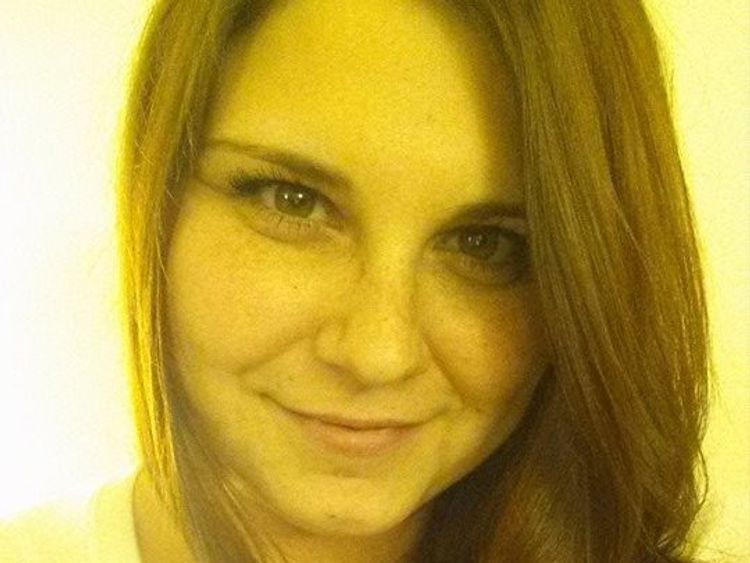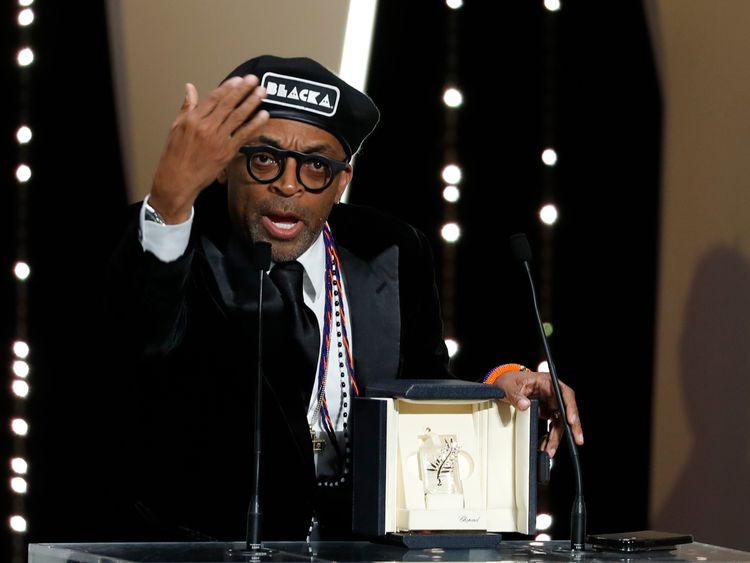The awards ceremony buzz has started, as we enter a season of ceremonies celebrating film.
But despite four Screen Actors Guild award nominations, and a trio of nods in the Golden Globes for his latest movie – BlacKkKlansman – director Spike Lee is feeling positively pessimistic.
The film tells the true story of Ron Stallworth, an undercover African-American detective from Colorado tasked with infiltrating the Klu Klux Klan in the 1970s.
A prolific filmmaker, Lee has now directed close to 40 films, which he refers to as "joints" due to the collaborative nature of the process.
However, despite working in Hollywood for over four decades, he feels the fact he has never been nominated in the best director category at the Oscars or BAFTAs is an oversight.
While he can't avoid the awards buzz completely, he questions the value of such recognition.
"I think about it but, it's not going to make or break me. I've had that experience, Do The Right Thing, did not get nominated for best picture. It's in the Library of Congress [The National Film Registry selects 25 films every year which they consider deserving of preservation. Do The Right Thing made the list in 1999].
"One of the greatest American films ever made and the proof is in the pudding. And the good stuff's going to last. And I don't say it disrespectfully, but the truth is that Do The Right Thing did not get nominated for best picture in 1989.
"The film that won – Driving Miss Daisy – no one's watching that film now."
Lee has previously said the fact Driving Miss Daisy won the Academy prize was worse than his own lack of recognition at the awards.
But lots has changed in the film world over the last 30 years – some of it with Lee's help.
He and his wife, TV producer Tonya Lewis, were at the forefront of the Oscars So White movement three years ago.
Lee says it's thanks to such action that the Academy is seeing more diverse nominations than ever before.
"My wife and I were two of the people along with Jada and Will Smith that really spoke up. And that really – along with the hashtag #OscarsSoWhite – made the Academy who for years have considered themselves liberal Hollywood – it made them look around and see there were not many people of colour.
"They expanded the voting members to make it more inclusive, more diverse. And that is why you're seeing the nominations now for people of colour that you did not see in the past."
But Lee is clear there is still much to be done.
Despite BlacKkKlansman being set in the 1970s, he draws on contemporary issues to highlight race-relations in today's society.
The phrase "America First" is chanted by Klan members during one scene.
The slogan has been in use since the 1920s, but has recently been given a new lease of life by the Trump administration which has embraced it as a key policy.

The movie also incorporates phone-shot video of violent clashes in 2017 between protesters and white nationalists attending a "Unite the Right" rally and counter-protesters in Charlottesville, Virginia.
The riots, which took place just as the film went into production.
Lee personally sought the blessing of Susan Bro, the mother of 32-year-old protester Heather Heyer who was killed during the violence, before using the footage.
Footage of Donald Trump giving a speech in which he refers to "fine people" on both sides of the clash is also inserted into the end of the film.
Lee explains his rationale for incorporating the real video.
"The stuff we're talking about in the film is not from a galaxy far far away, to give homage to George Lucas and Star Wars. This stuff is now and today. When you leave this theatre or in this case home, this is the world you live in, not in the mid-70s."
When it premiered at the Cannes Film Festival, it received a six-minute standing ovation at Cannes.

It also took home the Cannes Grand Prix.
But as far as the Oscars go, Spike's not holding his breath.
"I have a very, very philosophical understanding of awards and the so-called prestige it can bring you. But, being honest with you, with what I went through with the snubs, I've never been nominated for best director, at Academy and BAFTA too.
"I've come to this place where, not just now but back early on, that I was not going to allow any group to be given the power to validate my work.
"Wasn't going to do it. I still feel that the work, whether you decide you want to award it or not, that's not going to stop the film from making the impact it's going to have on the world.
"I mean, would I like to be nominated and win? Yes, but that's not going to… In the long run, that's not going to be the thing that film's remembered for."
More from Ents & Arts
With Oscar nominations announced in the New Year, Lee doesn't have long to wait.
On 22 January he'll find out whether BlacKkKlansman can triumph where Do The Right Thing did not, nearly 29 years ago.
The awards ceremony buzz has started, as we enter a season of ceremonies celebrating film.
But despite four Screen Actors Guild award nominations, and a trio of nods in the Golden Globes for his latest movie – BlacKkKlansman – director Spike Lee is feeling positively pessimistic.
The film tells the true story of Ron Stallworth, an undercover African-American detective from Colorado tasked with infiltrating the Klu Klux Klan in the 1970s.
A prolific filmmaker, Lee has now directed close to 40 films, which he refers to as "joints" due to the collaborative nature of the process.
However, despite working in Hollywood for over four decades, he feels the fact he has never been nominated in the best director category at the Oscars or BAFTAs is an oversight.
While he can't avoid the awards buzz completely, he questions the value of such recognition.
"I think about it but, it's not going to make or break me. I've had that experience, Do The Right Thing, did not get nominated for best picture. It's in the Library of Congress [The National Film Registry selects 25 films every year which they consider deserving of preservation. Do The Right Thing made the list in 1999].
"One of the greatest American films ever made and the proof is in the pudding. And the good stuff's going to last. And I don't say it disrespectfully, but the truth is that Do The Right Thing did not get nominated for best picture in 1989.
"The film that won – Driving Miss Daisy – no one's watching that film now."
Lee has previously said the fact Driving Miss Daisy won the Academy prize was worse than his own lack of recognition at the awards.
But lots has changed in the film world over the last 30 years – some of it with Lee's help.
He and his wife, TV producer Tonya Lewis, were at the forefront of the Oscars So White movement three years ago.
Lee says it's thanks to such action that the Academy is seeing more diverse nominations than ever before.
"My wife and I were two of the people along with Jada and Will Smith that really spoke up. And that really – along with the hashtag #OscarsSoWhite – made the Academy who for years have considered themselves liberal Hollywood – it made them look around and see there were not many people of colour.
"They expanded the voting members to make it more inclusive, more diverse. And that is why you're seeing the nominations now for people of colour that you did not see in the past."
But Lee is clear there is still much to be done.
Despite BlacKkKlansman being set in the 1970s, he draws on contemporary issues to highlight race-relations in today's society.
The phrase "America First" is chanted by Klan members during one scene.
The slogan has been in use since the 1920s, but has recently been given a new lease of life by the Trump administration which has embraced it as a key policy.

The movie also incorporates phone-shot video of violent clashes in 2017 between protesters and white nationalists attending a "Unite the Right" rally and counter-protesters in Charlottesville, Virginia.
The riots, which took place just as the film went into production.
Lee personally sought the blessing of Susan Bro, the mother of 32-year-old protester Heather Heyer who was killed during the violence, before using the footage.
Footage of Donald Trump giving a speech in which he refers to "fine people" on both sides of the clash is also inserted into the end of the film.
Lee explains his rationale for incorporating the real video.
"The stuff we're talking about in the film is not from a galaxy far far away, to give homage to George Lucas and Star Wars. This stuff is now and today. When you leave this theatre or in this case home, this is the world you live in, not in the mid-70s."
When it premiered at the Cannes Film Festival, it received a six-minute standing ovation at Cannes.

It also took home the Cannes Grand Prix.
But as far as the Oscars go, Spike's not holding his breath.
"I have a very, very philosophical understanding of awards and the so-called prestige it can bring you. But, being honest with you, with what I went through with the snubs, I've never been nominated for best director, at Academy and BAFTA too.
"I've come to this place where, not just now but back early on, that I was not going to allow any group to be given the power to validate my work.
"Wasn't going to do it. I still feel that the work, whether you decide you want to award it or not, that's not going to stop the film from making the impact it's going to have on the world.
"I mean, would I like to be nominated and win? Yes, but that's not going to… In the long run, that's not going to be the thing that film's remembered for."
More from Ents & Arts
With Oscar nominations announced in the New Year, Lee doesn't have long to wait.
On 22 January he'll find out whether BlacKkKlansman can triumph where Do The Right Thing did not, nearly 29 years ago.












